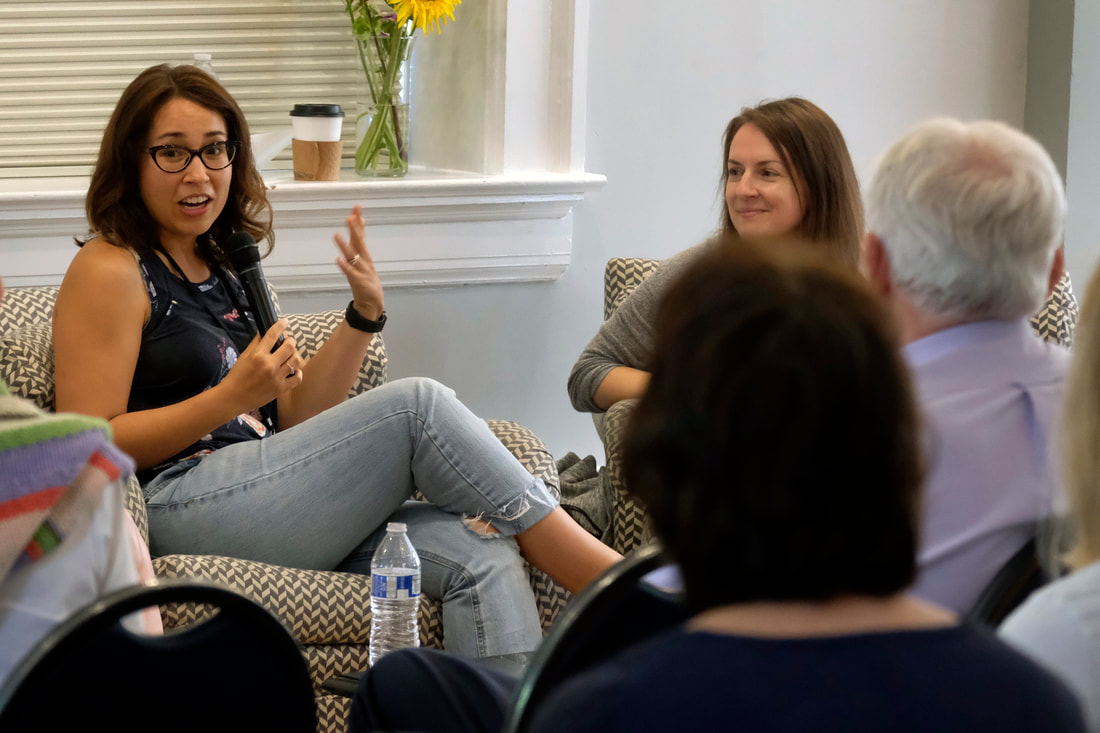 Chris Offutt, author of screenplays, memoirs, and several short stories and novels set in Kentucky, speaks at the 2019 Books in Progress Conference. Photo by Tom Eblen of the Carnegie Center. Chris Offutt, author of screenplays, memoirs, and several short stories and novels set in Kentucky, speaks at the 2019 Books in Progress Conference. Photo by Tom Eblen of the Carnegie Center. This part isn’t supposed to be fun. But, for some reason, it is. Perhaps it’s only because I’m on the front end of the process, and it’s still fresh and new. The rejections haven’t started rolling in yet, overwhelming my inbox. At this stage, at least, I’m finding it fascinating to research literary agents and small independent presses, trying to discover that perfect fit for my novel. The whole publishing industry seems like a giant corn maze: I just need to take my time, peer around each corner, decide whether to go this direction, or maybe that direction. I expect I’ll find something interesting—even if not useful—either way I go. It’s an extraordinarily complex business, or so it seems to the uninitiated. There are so many layers, so many ways you could get tripped up. In fact, it may be because the odds seem so long that it feels more like a game than anything of serious import. It’s like playing Monopoly or Risk, where you can go all in without suffering any real consequences. I’m some anonymous sad sack submitting my first-born to a sophisticated, highly literate, beautiful person in New York or Chicago. What can I possibly expect? They say that the writer-agent relationship is like a marriage. You look for someone you trust, someone you like, someone who shares your taste, someone who has your best interests at heart, someone who will stay with you for the long haul. That seems much more interesting than looking for a business manager. And it shifts the emphasis away from that piece of writing—which can make you morbidly insecure—to the human being who is going to share this journey with you, who will take your hand and guide you through the impenetrable process. Recently, at the 2019 Books in Progress Conference at the Carnegie Center in Lexington, Ky., I was buoyed by award-winning author Chris Offutt’s approach to this phase of writing. When he was a young man, a graduate of the esteemed Iowa Writers’ Workshop—someone with talent and credentials and well-known mentors—he struggled to submit his stories to literary journals. His peers prodded him, but he just didn’t think he could face the ego-busting rejections. To flip the script, so to speak, he decided to set a goal for himself: 100 rejections in one year. He was ecstatic as each one arrived in his mailbox. He kept a careful tally. The rejections stacked up. Then one day, the mailman delivered something unexpected: an acceptance letter from the Coe Review. He was crestfallen. Having amassed 86 rejections, he had just missed the goal he had set for himself. At the same conference, I attended a panel discussion that included a successful young writer and her equally young agent. (I’ve heard the average age of agents is 27, a real obstacle for a woman of a certain age who has written about a middle-aged couple who lived nearly 100 years ago.} The writer revealed that she had searched for an agent for eight years. She kept writing, undeterred, and she kept looking for someone to give her a chance. She and her agent have now enjoyed a 10-year career together. It was clear they have a supportive, mutually beneficial relationship. They poked mild fun at each other and finished each other’s sentences, just like an old married couple. I can promise you I won’t be that dogged. I’m highly suspect that my lifespan will even extend another eight years, let alone my determination to publish a novel. I’ll be swept away by some other shiny object long before then. Another project. Another hobby. Another way to test my mettle. But, for the next few months, I’ll do the necessary research. I expect I’ll send scores of query letters and receive an equal number of rejections. I’ll keep Chris Offut’s approach in mind, just to maintain my equanimity. And if something positive happens, I’ll remind myself that finding an interested agent is just the initial step. Then you typically endure another grueling editing process. Then agonize as your book is submitted to publishing houses for new editors to scrutinize. And if you’re really, really lucky, then you get to go through lengthy contractual negotiations and watch helplessly as the publisher’s creative team comes up with a new title and a book cover you’re not sure about. Then it’s time to pore over that final proof, looking for any remaining errors or typos while you secretly fret that the book is no good after all. Yeah, I’d better grab my fun while I can.
4 Comments
David Hoefer
6/10/2019 05:45:17 pm
Hmmm…"I’m some anonymous sad sack submitting my first-born to a sophisticated, highly literate, beautiful person in New York or Chicago." No, I don't think so. They're not that sophisticated - not really - and you're certainly no rube, anonymous or otherwise. They just know some of the ins and outs better than you (or I) do. We made TLR happen, and you'll make your novel happen too. I'd put money on it.
Reply
Sallie Showalter
6/10/2019 09:53:52 pm
You're right, David. Murky Press will publish the novel if I fail to find another willing publishing house. I will get it in the hands of my dear fans who are already clamoring for a copy!
Reply
Rogers Barde
6/26/2019 08:37:03 am
I love hearing about your Carnegie experience. I love your optimism and willingness to try. I am also eager to hear more about your interview with the agent. Now I need to finish my book and get going with the rejections! And Murky Press is in my mind too!
Reply
Your comment will be posted after it is approved.
Leave a Reply. |
Details
Archives
June 2023
Categories
All
|



 RSS Feed
RSS Feed